Fleurs du Mal Magazine


Or see the index

Poe’s cottage at Fordham
Here lived the soul enchanted
By melody of song;
Here dwelt the spirit haunted
By a demoniac throng;
Here sang the lips elated;
Here grief and death were sated;
Here loved and here unmated
Was he, so frail, so strong.
Here wintry winds and cheerless
The dying firelight blew,
While he whose song was peerless
Dreamed the drear midnight through,
And from dull embers chilling
Crept shadows darkly filling
The silent place, and thrilling
His fancy as they grew.
Here with brows bared to heaven,
In starry night he stood,
With the lost star of seven
Feeling sad brotherhood.
Here in the sobbing showers
Of dark autumnal hours
He heard suspected powers
Shriek through the stormy wood.
From visions of Apollo
And of Astarte’s bliss,
He gazed into the hollow
And hopeless vale of Dis,
And though earth were surrounded
By heaven, it still was mounded
With graves. His soul had sounded
The dolorous abyss.
Poor, mad, but not defiant,
He touched at heaven and hell.
Fate found a rare soul pliant
And wrung her changes well.
Alternately his lyre,
Stranded with strings of fire,
Led earth’s most happy choir,
Or flashed with Israfel.
No singer of old story
Luting accustomed lays,
No harper for new glory,
No mendicant for praise,
He struck high chords and splendid,
Wherein were finely blended
Tones that unfinished ended
With his unfinished days.
Here through this lonely portal,
Made sacred by his name,
Unheralded immortal
The mortal went and came.
And fate that then denied him,
And envy that decried him,
And malice that belied him,
Here cenotaphed his fame.
John Henry Boner
(1845-1903)
poetry
fleursdumal.nl magazine
More in: Archive A-B, Edgar Allan Poe, Poe, Edgar Allan
In the period between 1815 and 1820, Mary Shelley wrote her most famous novel, Frankenstein; or, The Modern Prometheus, as well as its companion piece, Mathilda, a tragic incest narrative that was confiscated by her father, William Godwin, and left unpublished until 1959. She also gave birth to four—and lost three—children.
 In this hybrid text, Rachel Feder interprets Frankenstein and Mathilda within a series of provocative frameworks including Shelley’s experiences of motherhood and maternal loss, twentieth-century feminists’ interests in and attachments to Mary Shelley, and the critic’s own experiences of pregnancy, childbirth, and motherhood.
In this hybrid text, Rachel Feder interprets Frankenstein and Mathilda within a series of provocative frameworks including Shelley’s experiences of motherhood and maternal loss, twentieth-century feminists’ interests in and attachments to Mary Shelley, and the critic’s own experiences of pregnancy, childbirth, and motherhood.
Harvester of Hearts explores how Mary Shelley’s exchanges with her children—in utero, in birth, in life, and in death—infuse her literary creations. Drawing on the archives of feminist scholarship, Feder theorizes “elective affinities,” a term she borrows from Goethe to interrogate how the personal attachments of literary critics shape our sense of literary history.
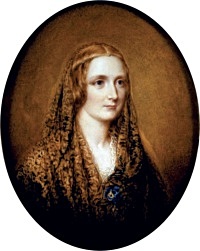 Feder blurs the distinctions between intellectual, bodily, literary, and personal history, reanimating the classical feminist discourse on Frankenstein by stepping into the frame.
Feder blurs the distinctions between intellectual, bodily, literary, and personal history, reanimating the classical feminist discourse on Frankenstein by stepping into the frame.
The result—at once an experimental book of literary criticism, a performative foray into feminist praxis, and a deeply personal lyric essay—not only locates Mary Shelley’s monsters within the folds of maternal identity but also illuminates the connections between the literary and the quotidian.
Rachel Feder is an assistant professor of English and literary arts at the University of Denver. Her scholarly and creative work has appeared in a range of publications including ELH, Studies in Romanticism, and a poetry chapbook from dancing girl press.
Rachel Feder (Author)
Harvester of Hearts
Motherhood under the Sign of Frankenstein
Cloth Text – $99.95
ISBN 978-0-8101-3753-0
Paper Text – $34.95
ISBN 978-0-8101-3752-3
August 2018
Women’s Studies
Literary Criticism
152 pages
Northwestern University Press
new books
fleursdumal.nl magazine
More in: - Book News, - Book Stories, Archive E-F, Archive S-T, Art & Literature News, Mary Shelley, Shelley, Mary, Shelley, Percy Byssche, Tales of Mystery & Imagination
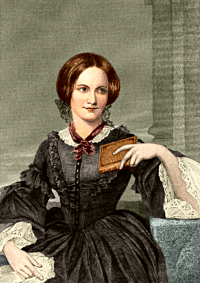
Presentiment
“Sister, you’ve sat there all the day,
Come to the hearth awhile;
The wind so wildly sweeps away,
The clouds so darkly pile.
That open book has lain, unread,
For hours upon your knee;
You’ve never smiled nor turned your head;
What can you, sister, see?”
“Come hither, Jane, look down the field;
How dense a mist creeps on!
The path, the hedge, are both concealed,
Ev’n the white gate is gone
No landscape through the fog I trace,
No hill with pastures green;
All featureless is Nature’s face.
All masked in clouds her mien.
“Scarce is the rustle of a leaf
Heard in our garden now;
The year grows old, its days wax brief,
The tresses leave its brow.
The rain drives fast before the wind,
The sky is blank and grey;
O Jane, what sadness fills the mind
On such a dreary day!”
“You think too much, my sister dear;
You sit too long alone;
What though November days be drear?
Full soon will they be gone.
I’ve swept the hearth, and placed your chair,.
Come, Emma, sit by me;
Our own fireside is never drear,
Though late and wintry wane the year,
Though rough the night may be.”
“The peaceful glow of our fireside
Imparts no peace to me:
My thoughts would rather wander wide
Than rest, dear Jane, with thee.
I’m on a distant journey bound,
And if, about my heart,
Too closely kindred ties were bound,
‘Twould break when forced to part.
“‘Soon will November days be o’er:’
Well have you spoken, Jane:
My own forebodings tell me more–
For me, I know by presage sure,
They’ll ne’er return again.
Ere long, nor sun nor storm to me
Will bring or joy or gloom;
They reach not that Eternity
Which soon will be my home.”
Eight months are gone, the summer sun
Sets in a glorious sky;
A quiet field, all green and lone,
Receives its rosy dye.
Jane sits upon a shaded stile,
Alone she sits there now;
Her head rests on her hand the while,
And thought o’ercasts her brow.
She’s thinking of one winter’s day,
A few short months ago,
Then Emma’s bier was borne away
O’er wastes of frozen snow.
She’s thinking how that drifted snow
Dissolved in spring’s first gleam,
And how her sister’s memory now
Fades, even as fades a dream.
The snow will whiten earth again,
But Emma comes no more;
She left, ‘mid winter’s sleet and rain,
This world for Heaven’s far shore.
On Beulah’s hills she wanders now,
On Eden’s tranquil plain;
To her shall Jane hereafter go,
She ne’er shall come to Jane!
Charlotte Brontë
(1816-1855)
poetry
fleursdumal.nl magazine
More in: Archive A-B, Archive A-B, Brontë, Anne, Emily & Charlotte

My Last Duchess
That’s my last Duchess painted on the wall,
Looking as if she were alive. I call
That piece a wonder, now : Frà Pandolf’s hands
Worked busily a day, and there she stands.
Will’t please you sit and look at her ? I said
‘Frà Pandolf’ by design, for never read
Strangers like you that pictured countenance,
The depth and passion of its earnest glance,
But to myself they turned (since none puts by
The curtain I have drawn for you, but I)
And seemed as they would ask me, if they durst,
How such a glance came there ; so, not the first
Are you to turn and ask thus. Sir, ’t was not
Her husband’s presence only, called that spot
Of joy into the Duchess’ cheek : perhaps
Frà Pandolf chanced to say ‘Her mantle laps
Over my lady’s wrist too much,’ or ‘Paint
Must never hope to reproduce the faint
Half-flush that dies along her throat :’ such stuff
Was courtesy, she thought, and cause enough
For calling up that spot of joy. She had
A heart―how shall I say ?―too soon made glad,
Too easily impressed ; she liked whate’er
She looked on, and her looks went everywhere.
Sir, ’t was all one! My favour at her breast,
The dropping of the daylight in the West,
The bough of cherries some officious fool
Broke in the orchard for her, the white mule
She rode with round the terrace―all and each
Would draw from her alike the approving speech,
Or blush, at least. She thanked men,―good! but thanked
Somehow―I know not how―as if she ranked
My gift of a nine-hundred-years-old name
With anybody’s gift. Who’d stoop to blame
This sort of trifling? Even had you skill
In speech―(which I have not)―to make your will
Quite clear to such an one, and say, ‘Just this
Or that in you disgusts me ; here you miss,
Or there exceed the mark’―and if she let
Herself be lessoned so, nor plainly set
Her wits to yours, forsooth, and made excuse,
―E’en then would be some stooping ; and I choose
Never to stoop. Of sir, she smiled, no doubt,
Whene’er I passed her ; but who passed without
Much the same smile? This grew ; I gave commands ;
Then all smiles stopped together. There she stands
As if alive. Will’t please you rise ? We’ll meet
The company below, then. I repeat,
The Count your master’s known munificence
Is ample warrant that no just pretence
Of mine for dowry will be disallowed ;
Though his fair daughter’s self, as I avowed
At starting, is my object. Nay, we’ll go
Together down, sir. Notice Neptune, though,
Taming a sea-horse, thought a rarity,
Which Claus of Innsbruck cast in bronze for me!
Robert Browning (1812 – 1889)
My Last Duchess
fleursdumal.nl magazine
More in: Archive A-B, Browning, Robert
Osip Mandelstam is one of the greatest of twentieth-century poets and Voronezh Notebooks, a sequence of poems composed between 1935 and 1937 when he was living in internal exile in the Soviet city of Voronezh, is his last and most exploratory work.
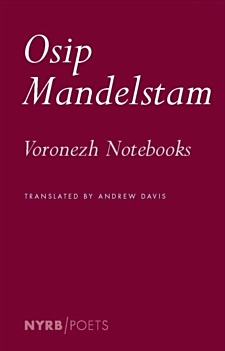 Meditating on death and survival, on power and poetry, on marriage, madness, friendship, and memory, challenging Stalin between lines that are full of the sights and sounds of the steppes, blue sky and black earth, the roads, winter breath, spring with its birds and flowers and bees, the notebooks are a continual improvisation and an unapologetic affirmation of poetry as life.
Meditating on death and survival, on power and poetry, on marriage, madness, friendship, and memory, challenging Stalin between lines that are full of the sights and sounds of the steppes, blue sky and black earth, the roads, winter breath, spring with its birds and flowers and bees, the notebooks are a continual improvisation and an unapologetic affirmation of poetry as life.
Russia’s greatest poet in this century. — Joseph Brodsky
Mandelstam was a tragic figure. Even while in exile in Voronej, he wrote works of untold beauty and power. And he had no poetic forerunners… In all of world poetry, I know of no other such case. We know the sources of Pushkin and Blok, but who will tell us from where that new, divine harmony, Mandelstam’s poetry, came from? — Anna Akhmatova
Voronezh Notebooks by Osip Mandelstam,
translated from the Russian and with an introduction by Andrew Davis
ISBN: 9781590179109
Pages: 128
Publication Date: January 5, 2016
Series: NYRB Poets
The New York Review of Books
Paperback
Books That Everyone Should Read
fleursdumal.nl magazine
More in: - Book Lovers, - Book Stories, Achmatova, Anna, Archive M-N, Brodsky, Joseph, Mandelstam, Osip, REPRESSION OF WRITERS, JOURNALISTS & ARTISTS, TRANSLATION ARCHIVE
Osip Mandelstam visited Armenia in 1930, and during the eight months of his stay, he rediscovered his poetic voice and was inspired to write an experimental meditation on the country and its ancient culture.
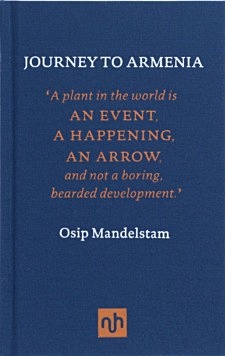 This edition also includes the companion piece, “Conversation About Dante,” which Seamus Heaney called “Osip Mandelstam’s astonishing fantasia on poetic creation.” An incomparable apologia for poetic freedom and a challenge to the Bolshevik establishment, the essay was dictated by the poet to his wife, Nadezhda Mandelstam, in 1934 and 1935, during the last phase of his itinerant life. It has close ties to the Journey to Armenia.
This edition also includes the companion piece, “Conversation About Dante,” which Seamus Heaney called “Osip Mandelstam’s astonishing fantasia on poetic creation.” An incomparable apologia for poetic freedom and a challenge to the Bolshevik establishment, the essay was dictated by the poet to his wife, Nadezhda Mandelstam, in 1934 and 1935, during the last phase of his itinerant life. It has close ties to the Journey to Armenia.
Osip Mandelstam (1891–1938) was born and raised in St. Petersburg, where he attended the prestigious Tenishev School, before studying at the universities of St. Petersburg and Heidelberg and at the Sorbonne.
Mandelstam first published his poems in Apollyon, an avant-garde magazine, in 1910, then banded together with Anna Akhmatova and Nicholas Gumilev to form the Acmeist group, which advocated an aesthetic of exact description and chiseled form, as suggested by the title of Mandelstam’s first book, Stone (1913). During the Russian Revolution, Mandelstam left Leningrad for the Crimea and Georgia, and he settled in Moscow in 1922, where his second collection of poems, Tristia, appeared.
Unpopular with the Soviet authorities, Mandelstam found it increasingly difficult to publish his poetry, though an edition of collected poems did come out in 1928. In 1934, after reading an epigram denouncing Stalin to friends, Mandelstam was arrested and sent into exile. He wrote furiously during these years, and his wife, Nadezhda, memorized his work in case his notebooks were destroyed or lost. (Nadezhda Mandelstam’s extraordinary memoirs of life with her husband, Hope Against Hope and Hope Abandoned, published in the 1970s, later helped to bring Mandelstam a worldwide audience.
Journey to Armenia by Osip Mandelstam,
introduction by Henry Gifford,
translated from the Russian by Sydney Monas, Clarence Brown, and Robert Hughes
Series: Notting Hill Editions
ISBN: 9781907903472
Pages: 192
Publication Date in Hardcover:
September 25, 2018
new books
fleursdumal.nl magazine
More in: - Book News, - Book Stories, Archive M-N, Art & Literature News, Mandelstam, Osip, REPRESSION OF WRITERS, JOURNALISTS & ARTISTS

Der Wal
K. J. gewidmet
Du. Dich wollt ich vom Himmel mir krallen,
Reißen tief in mein Leben hinein;
Tag ist eben zu Splittern zerfallen,
Sonne tröpfelt, nun süßerer Wein.
Ob meiner Hand,
Greisingewand,
Schleiert schon weißer der neblichte Schein.
Du. Du weidest auf kühleren Wiesen,
Schaumglasäckern, Gefilden der Flut,
Hinverwandelt zum schwebenden Riesen,
Der bei den Müttern der Bläue ruht.
Felsen von Eis
Stromen dir leis
Reinere Kissen, ihr silbernes Blut.
Was du empfunden, als Labe, als Beule,
Was du in Helle gedacht und begehrt,
Wirft dir vom Haupte die tanzende Säule
Höher ins Dunkel, das sprudelnde Schwert.
Lilie aus Gischt
Blüht und erlischt:
Seele, von ewigem Wogen verzehrt.
Warst du so stark je, so Stummheit und Rune?
War je dein Atem so hauchend und groß?
Stürzt dir mein frevelnder Schrei die Harpune,
Zerrst du durch jagende Qualen dich los?
Irgendwo weit,
Leicht in der Zeit,
Taumelt ein leeres, gekentertes Floß.
Gertrud Kolmar
(1894-1943)
gedicht: Der Wal
fleursdumal.nl magazine
More in: Archive K-L, Archive K-L, Kolmar, Gertrud
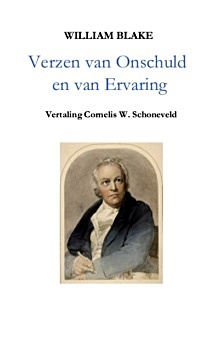
DE ENGEL
Ik had een Droom, die uitleg vraagt!
’k Was een Prinses en was een maagd,
Door een Engel mild bewaakt:
Dwaas verdriet werd nooit gelaakt!
En ik huilde dag en nacht,
En mijn wee werd steeds verzacht,
En ik huilde nacht en dag
En verborg mijn blijde lach.
Dus hij vluchtte op wieken heen;
Toen de dag met blos verscheen
Stelde ik mij, traan droog, te weer
Duizendvoud met schild en speer.
En mijn Engel keerde weer,
Maar mijn wapen sloeg hem neer;
Want mijn jeugdtijd was voorbij,
En grijs hoofdhaar tooide mij
William Blake
vertaald door: Dr. Cornelis W. Schoneveld
THE ANGEL
I Dreamt a Dream! what can it mean?
And that I was a maiden Queen:
Guarded by an Angel mild;
Witless woe, was neer beguil’d!
And I wept both night and day
And he wip’d my tears away
And I wept both day and night
And hid from him my hearts delight
So he took his wings and fled:
Then the morn blush’d rosy red:
I dried my tears & armd my fears,
With ten thousand shields and spears.
Soon my Angel came again;
I was arm’d, he came in vain:
For the time of youth was fled
And grey hairs were on my head
William Blake (1757 – 1827)
Poem: The Angel
Vertaling uit:
Verzen van Onschuld en van Ervaring
William Blake
vertaald door: Dr. Cornelis W. Schoneveld
paperback
gebrocheerd
€ 20,00
ISBN: 978-90-824288-1-0
geïllustreerd
116 blz.
mei 2017
Uitgeverij De Wilde Tomaat
new translations
fleursdumal.nl magazine
More in: - Book Stories, Archive A-B, Blake, Blake, William, TRANSLATION ARCHIVE
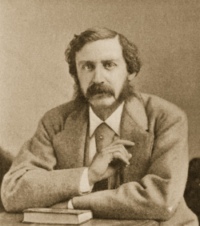
What the Bullet sang
O Joy of creation,
To be!
O rapture, to fly
And be free!
Be the battle lost or won,
Though its smoke shall hide the sun,
I shall find my love–the one
Born for me!
I shall know him where he stands
All alone,
With the power in his hands
Not o’erthrown;
I shall know him by his face,
By his godlike front and grace;
I shall hold him for a space
All my own!
It is he–O my love!
So bold!
It is I–all thy love
Foretold!
It is I–O love, what bliss!
Dost thou answer to my kiss?
O sweetheart! what is this
Lieth there so cold?
Bret Harte
(1839-1902)
What the Bullet sang
fleursdumal.nl magazine
More in: Archive G-H, Archive G-H, Bret Harte, CLASSIC POETRY, WAR & PEACE

An den Tod
Wie den Seraph himmlische Lust erfüllet,
Kommt der Brüder einer, auch selger Engel,
Den des Himmels Freundschaft mit ihm verwebte
Zu dem unsterblichen Bunde,
Wieder von der fernesten Welten einer
Wo er Glück und Segen die Fülle ausstreut
Heitre Ruhe mit friedlicher Palme über
Tausend Geschöpfe ergossen,
Und nun fällt in Engels Entzücken seinem
Freunde an die himmlische Brust und dann im
Kusse, unaussprechbare Freundschaftswonne
Einet die Seelen der Seraphs.
So werd ich mich freuen wenn du einst holder
Todesengel meine geengte Seele
Zu dem selgen Anschaun Jehovas durch die
Trennung vom Körper beflügelst.
Und sich dann die neidische Hülle abstreift
Gleich der Puppe welche den Schmetterling hält
Und zerplatzet kommet die Zeit der Reife,
Jener befreit dann entfliehet.
So wird sie auch fliehen die edle Seele
Aus dem Erdenstaube entlastet dort zu
Jenen höhern, bessern Gefilden reich an
Seliger Ruhe und Freiheit.
Wo ein ewger Frühling die Wangen kleidet
Und ich voll unsterblicher Kraft die Schöpfung
Sehe, staune, himmlische Freundschaft mich un-
sterblichen Geistern vereinet
Novalis (1772 – 1801)
Gedicht: An den Tod
fleursdumal.nl magazine
More in: Archive M-N, Novalis, Novalis
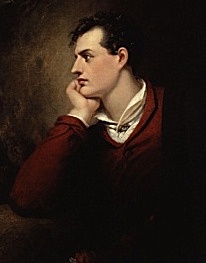
When we two parted
When we two parted
In silence and tears,
Half broken-hearted,
To sever for years,
Pale grew thy cheek and cold,
Colder thy kiss;
Truly that hour foretold
Sorrow to this.
The dew of the morning
Sank chill on my brow
It felt like the warning
Of what I feel now.
Thy vows are all broken,
And light is thy fame:
I hear thy name spoken,
And share in its shame.
They name thee before me,
A knell to mine ear;
A shudder comes o’er me
Why wert thou so dear?
They know not I knew thee,
Who knew thee too well:
Long, long shall I rue thee
Too deeply to tell.
In secret we met
In silence I grieve
That thy heart could forget,
Thy spirit deceive.
If I should meet thee
After long years,
How should I greet thee?
With silence and tears.
Lord George Gordon Noel Byron
(1788 – 1824)
When we two are parted
fleursdumal.nl magazine
More in: Archive A-B, Byron, Lord

Der Engel im Walde
Gib mir deine Hand, die liebe Hand, und komm mit mir;
Denn wir wollen hinweggehen von den Menschen.
Sie sind klein und böse, und ihre kleine Bosheit haßt und peinigt uns.
Ihre hämischen Augen schleichen um unser Gesicht, und
ihr gieriges Ohr betastet das Wort unseres Mundes.
Sie sammeln Bilsenkraut . . .
So laß uns fliehn
Zu den sinnenden Feldern, die freundlich mit Blumen und
Gras unsere wandernden Füße trösten,
An den Strom, der auf seinern Rücken geduldig wuchtende
Bürden, schwere, güterstrotzende Schiffe trägt,
Zu den Tieren des Waldes, die nicht übelreden.
Komm.
Herbstnebel schleiert und feuchtet das Moos mit dumpf
smaragdenem Leuchten.
Buchenlaub rollt, Reichtum goldbronzener Münzen.
Vor unseren Schritten springt, rote zitternde Flamme,
das Eichhorn nur.
Schwarze gewundene Erlen züngeln am Pfuhl empor in
kupfriges Abendglasten.
Komm.
Denn die Sonne ist nieder in ihre Höhle gekrochen, und ihr
warmer rötlicher Atem verschwebt.
Nun tut ein Gewölb sich auf.
Unter seinem graublauen Bogen zwischen bekrönten Säulen
der Bäume wird der Engel stehn,
Hoch und schmal, ohne Schwingen.
Sein Antlitz ist Leid.
Und sein Gewand hat die Bleiche eisig blinkender Sterne
in Winternächten.
Der Seiende,
Der nicht sagt, nicht soll, der nur ist,
Der keinen Fluch weiß noch Segen bringt und nicht in
Städte hinwallt zu dem, was stirbt :
Er schaut uns nicht
In seinem silbernen Schweigen.
Wir aber schauen ihn,
Weil wir zu zweit und verlassen sind.
Vielleicht
Weht ein braunes, verwelktes Blatt an seine Schulter,
entgleitet;
Das wollen wir aufheben und verwahren, ehe wir weiterziehn.
Komm, mein Freund, mit mir, komm.
Die Treppe in meines Vaters Haus ist dunkel und krumm
und eng, und die Stufen sind abgetreten;
Aber jetzt ist es das Haus der Waise, und fremde Leute wohnen darin.
Nimm mich fort.
Schwer fügt der alte rostige Schlüssel im Tor sich meinen
schwachen Händen.
Nun knarrt es zu.
Nun sieh mich an in der Finsternis, du, von heut meine Heimat.
Denn deine Arme sollen mir bergende Mauern baun,
Und dein Herz wird mir Kammer sein und dein Auge mein
Fenster, durch das der Morgen scheint.
Und es türmt sich die Stirn, da du schreitest.
Du bist mein Haus an allen Straßen der Welt, in jeder
Senke, auf jedem Hügel.
Du Dach, du wirst ermattet mit mir unter glühendem
Mittag lechzen, mit mir erschauern, wenn Schneesturm
peitscht.
Wir werden dürsten und hungern, zusammen erdulden,
Zusammen einst an staubigem Wegesrande sinken und weinen …
Gertrud Kolmar
(1894-1943)
gedicht: Der Engel im Walde
fleursdumal.nl magazine
More in: Archive K-L, Archive K-L, Kolmar, Gertrud
Thank you for reading Fleurs du Mal - magazine for art & literature